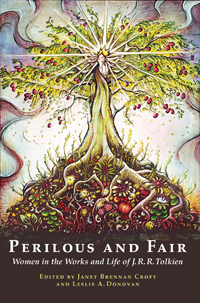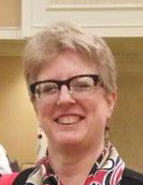OMS 4 - Online MidSummer Seminar 2025

Online MidSummer Seminar 2025
More Perilous and Fair: Women and Gender in Mythopoeic Fantasy
Via Zoom and Discord
OMS Overview
OMS 4 Call for Papers
ONLINE MIDSUMMER SEMINAR 2025
More Perilous and Fair: Women and Gender in Mythopoeic Fantasy
Celebrating the 10th anniversary of the publication of Perilous and Fair: Women in the Works and Life of J.R.R. Tolkien
Co-chairs: Cami Agan, Clare Moore, and Robin Anne ReidJoin us for an online conference that focuses on intersectional feminist approaches to women and gender in fantasy, science fiction, speculative fiction, or other mythopoeic work and that will honor the first anthology on women and Tolkien, Perilous and Fair: Women in the Works and Life of J.R.R. Tolkien (2015), edited by Janet Brennan Croft and Leslie A. Donovan.
Intersectionality, or intersectional approaches, developed out of research and scholarship by Black women, highlighting how aspects of identity (such as race, gender, sexual orientation, or class) overlap and intersect. Since then, feminist scholars in a number of disciplines, including literary studies, have adapted intersectionality in their work.
GUESTS OF HONOR: Janet Brennan Croft and Leslie A. Donovan, co-editors of Perilous and Fair

Janet Brennan Croft is an Associate University Librarian at the University of Northern Iowa. She is the author of the Mythopoeic Award winning War in the Works of J.R.R. Tolkien (Praeger 2004, reissued in paperback 2024), and has written on the Peter Jackson Middle-earth films, the Whedonverse, Orphan Black, J.K. Rowling, Terry Pratchett, Lois McMaster Bujold, The Devil Wears Prada, and other authors, TV shows, and movies. She is editor or co-editor of many collections of literary essays, the most recent being Loremasters and Libraries in Fantasy and Science Fiction, co-edited with Jason Fisher. She has edited the semi-annual refereed scholarly journal Mythlore since 2006, and is archivist and assistant editor of Slayage: The International Journal of Buffy+.

Leslie A. Donovan is Interim Dean and Professor for the Honors College at the University of New Mexico, in Albuquerque, New Mexico, USA. As a faculty member, she teaches varied interdisciplinary humanities courses for undergraduates, among which are six different versions of Tolkien courses. Her Tolkien studies publications include “The Valkyrie Reflex in J.R.R. Tolkien’s The Lord of the Rings: Galadriel, Shelob, Éowyn, and Arwen” (republished several times), “Middle-earth Mythology: An Overview” (Blackwell 2022), and four entries for the J.R.R. Tolkien Encyclopedia (Routledge 2006). She edited Approaches to Teaching Tolkien’s Lord of the Rings and Other Works (MLA 2015). In addition, she is the Editor of Mythopoeic Press.
CALL FOR PAPERS
The CFP deadline is March 31st, 2025.
Download the CFP in PDF format HERE.
The Mythopoeic Society invites paper submissions for an online conference that focuses on intersectional feminist approaches to women and gender in fantasy, science fiction, speculative fiction or other mythopoeic work. While the focus of this seminar is women and gender in mythopoeic works, we encourage proposals that acknowledge and analyze the intersectionality of gender with other aspects of identity, experience, and embodiment, including the non-human. Proposals should engage with developments in women and gender studies that both acknowledge and seek to move beyond the work of Perilous and Fair, drawing on theories and methodologies from recent years.
Aspects of this topic might include but are certainly not limited to any of the following:Papers, panels, and roundtables from a variety of critical perspectives and disciplines are welcome. We are interested in ANY form of media — text, graphic novels, comics, television, movies, music and music videos, games — as long as it can be described as fantasy or otherwise mythopoeic. We also welcome papers on the work of either of our Guests of Honor.
Each presentation will receive a 50-minute slot to allow time for questions, but individual presentations should be timed for oral presentation in 40 minutes maximum. Two or three presenters who wish to present short, related papers may also share one 50-minute slot.
Individual proposals (~200 words) with bios (150 words, maximum) should be sent to: oms-chair @ mythcon.org by March 31, 2025.
Group (two or three presenters) proposals should group the individual proposals together to send to: oms-chair @ mythcon.org by March 31, 2025.
Working bibliographies are welcome, but not required.
Participants are encouraged to submit papers chosen for the conference to Mythlore, the refereed journal of the Mythopoeic Society. All papers should conform to the 9th edition of the MLA Style Manual.
About the co-chairs:
Cami Agan is Distinguished University Professor of English at Oklahoma Christian University, where she teaches British Literature, including a Studies in Tolkien course. Her Tolkien research concentrates on the First Age materials with a particular interest in cultural geography and the elegiac resonances of the lost Beleriand. Her recent publications include articles in Mythlore and Journal of the Fantastic in the Arts, a chapter in Robin Anne Reid’s forthcoming work on race, racisms in Tolkien, and the recently published Cities and Strongholds in Middle-earth (Mythopoeic Press).Clare Moore is a Ph.D. student at the University of Glasgow. She holds an M.F.A. in Creative Writing and a B.A. in Politics, Philosophy, and Economics. Her research focuses on disability, gender, and race in the works of J.R.R. Tolkien and other fantastic literature and has appeared in Mallorn, Journal of Tolkien Research, and Mythlore. Her essay “‘A Song of Greater Power’: Tolkien’s Construction of Lúthien Tinúviel” won the 2022 Tolkien Society Award for Best Article.
Robin Anne Reid happily retired in 2020 to become an independent scholar. She is editing two anthologies for McFarland: one (co-edited with Christopher Vaccaro and Stephen Yandell) on queer approaches to Tolkien, and the other on race and racisms in Tolkien. She recently curated a collection of responses to a ground-breaking and posthumously published work on racism and The Lord of the Rings by Charles W. Mills (Mythlore #143, 2023). She is the editor for a new McFarland series, Studies in Tolkien, which opens for proposals in 2025. Somewhere in there, she’ll start working on her book about atheist, agnostic, and animist readers of Tolkien.



